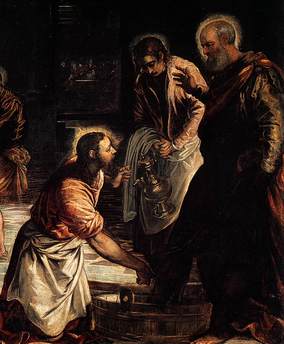 One of the themes from Oblate retreat this past weekend was humility. And from within the Gospel and Saint Benedict's vision of humility Brother John Mark spoke about love and fraternal relations, particularly rubbing elbows in true charity with your brother and sister in community. A stone is only polished when it meets other stones.
One of the themes from Oblate retreat this past weekend was humility. And from within the Gospel and Saint Benedict's vision of humility Brother John Mark spoke about love and fraternal relations, particularly rubbing elbows in true charity with your brother and sister in community. A stone is only polished when it meets other stones.Pope Benedict brings up the human desire to be in community with other other people: how good it is for brothers and sisters to live in unity, St Paul says. But this unity and love have one condition: "You will love your neighbor as yourself" (Romans 13:8-10). Some take this point as an easy thing to do. I assure you, it is not. This past Sunday's Scripture readings teach this point.
In his Rule, Saint Benedict places a strong emphasis on mutual responsibility ("a reciporcal responsibility" the Pope calls it) and charity toward the other person is lived only in a personal way. Benedict XVI argues as Saint Benedict did before him, "that there is a co-responsibility in the journey of the Christian life: everyone, conscious of his own limits and defects, is called to welcome fraternal correction and to help others with this particular service [of forgiveness and healing injuries].
Matthew 18 frames the issue for us. There are times in our relations that we behave badly; we say something that hurts another uncessarily, or we do something that wounds a relationship. There are sins we commit which break a relationship. The way to repair the injured relationship --and forgivness is always to be offered and received-- is to ask the other to change his or her behavior that is more consistent with what and who Jesus is. This conversation has to happen after we have looked at our own sins, asked for forgiveness (personally and sacramentally) in the context of humility, that is, of knowing your own abilities and limitations, especially before God. Anything and anyway else just doesn't work.
Quoting Saint Augustine, the Pope brings to the table that forgiveness is necessary. The Doctor of the Church stated once: "He who has offended you, in offending, he has caused himself a grave injury, and will you not care for the wound of your brother? [...] You must forget that you have been offended but not your brother's wound" (Sermon 82,7).
Wow. Augustine turns the tables by saying that in trying to wound another person the wounder actually wounds himself more. Our response, then, it is that we ought to forget the personal injury by repairing the wounder's injury. Turn the other cheek, Christ admonishes, Augustine and Benedict reminds. Hard words to live by.
The Pope reminds (watch the Benedict's remarks): Fraternal correction is only possible if you know the other person and live in humility.


Leave a comment